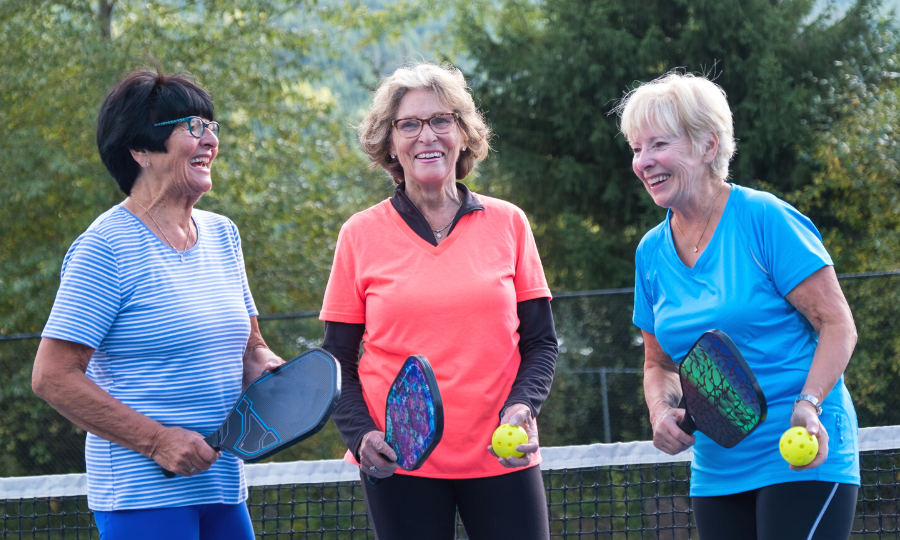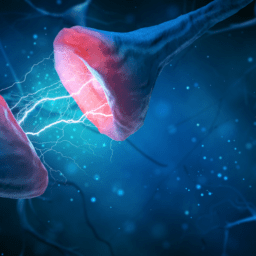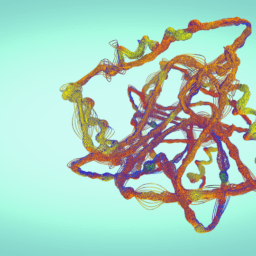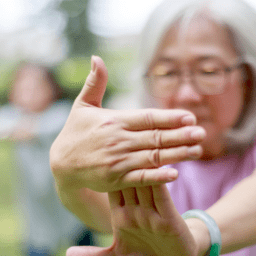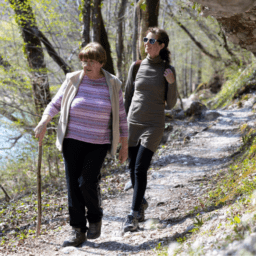Copper exposure and increased risks. DBS and excessive drooling. TMAO as a biomarker. Pickleball for Parkinson’s. Stigma, Parkinson’s, and co-existing conditions. The best artificial intelligence for diagnosing Parkinson’s. Here’s what’s new in the world of Parkinson’s this month.
PARKINSON’S ARTICLES
- Findings from a study published in Movement Disorders suggest that alpha-synuclein may not be the only protein that can aggregate and lead to Parkinson’s. While studying the brain of someone recently deceased who had been diagnosed with Parkinson’s, researchers at Osaka University found no Lewy bodies containing alpha-synuclein in any of the brain regions normally affected in Parkinson’s; instead, they found accumulations of the protein TDP-43 (transactive response DNA-binding protein of 43 kDa), a buildup that occurs in other neurodegenerative diseases such as amyotrophic lateral sclerosis (ALS) and frontotemporal lobar degeneration.
- In other alpha-synuclein news, German scientists explain in a paper published in Brain how a biochemical blood-based test that can detect alpha-synuclein inside neuron-derived extracellular vesicles may help providers diagnose and monitor the progression of Parkinson’s.
- Also exploring alpha-synuclein, a team of researchers from the University of Limerick and Emra, a materials and technology research company, found that when exposed to large amounts of copper ions, alpha-synuclein takes on an abnormal shape. The study is one of many exploring the role of biometals in the development and progression of Parkinson’s.
- Researchers at Hebrew University of Jerusalem reported that using quantitative MRI (qMRI) allowed them to see changes in the tissue structure within distinct sections of the striatum (a region in the deep brain), a technique that previously was only possible via lab tests after a person had died. The technique may help clinicians diagnose Parkinson’s in its early stages. The findings were published in Science Advances.
- Research presented at the 8th European Academy of Neurology (EAN) Congress suggests that the amount of time someone lives with Parkinson’s may come down to specific gene mutations. Scientists from four institutes in Paris, including the Paris Brain Institute at the Sorbonne Université, analyzed records of 2,037 people with Parkinson’s from their first hospital visit onward and found that people with either the LRRK2 or PRKN gene mutations had a longer survival time than people with Parkinson’s who did not have a gene mutation. Their data also showed that people with the SNCA or GBA mutations had a shorter survival time than those without a mutation. “These are important new insights which could help the development of new drugs targeting these genetic variants to slow down or stop [Parkinson’s progression],” the lead author said.
- A paper published in JAMA Neurology provided six actionable steps that stakeholders around the world can take to address the increasing number of people living with Parkinson’s and the associated financial and health service strains.
- Findings from a UK study published in Acta Psychiatrica Scandinavica showed that while delirium is common among people with Parkinson’s, it often goes undocumented in medical records and is rarely mentioned in discharge instructions when people with the symptom leave the hospital.
- The Parkinson’s Foundation recently announced the expansion of its Global Care Network in the U.S. with the addition of four Centers of Excellence and six Comprehensive Care Centers. The expansion aims to increase access to high-quality Parkinson’s care nationwide and to recognize centers that are providing excellent care within a broad geographic region.
- A study published in the Annals of Clinical and Translational Neurology found that the use of antidepressants or anti-anxiety medications was linked to a higher risk of Parkinson’s in women 65 and older. Researchers analyzed longitudinal data collected from the Women’s Health Initiative, which included data from 53,996 women followed for an average of 14.39 years, and found that the use of antidepressants and anti-anxiety medications were linked to a significantly elevated risk of developing Parkinson’s. The researchers noted that it may not be the medications but “the underlying psychiatric disorders, namely depression/anxiety, [that] are the actual predisposing factors.”
- Research by a team at Simon Fraser University and published in the Proceedings of the National Academy of Sciences suggests that by using new technology and methods to measure the activity of lysosomal glucocerebrosidase (GCase), clinicians may be able to use blood samples to monitor how Parkinson’s progresses in the brain. GCase is an enzyme commonly linked to Parkinson’s, and the researchers believe that the ability to accurately measure the lysosomal activity of GCase could help experts better understand the root causes of Parkinson’s, as well as help with diagnoses and tracking the progression of Parkinson’s.
- A small study published in BMC Neurology found that the best way to detect freezing of gait in people with Parkinson’s is to measure the person’s acceleration and orientation using wearable sensors on the person’s legs and waist.
- In other wearable sensors news, a study published in the Journal of Neural Transmission suggests that evaluating a person’s heart rate using a sensor on their wrist may help detect Parkinson’s in its early stages. The study builds on previous research indicating that lesser heart rate variability is associated with an increased risk of Parkinson’s.
- Bacterial-derived metabolites, particularly trimethylamine-N-oxide (TMAO), may be a biomarker of Parkinson’s, and modifications of the microbiota could be an effective therapy, a study published in Neurobiology of Disease suggests.
- In two new papers (published in the Journal of Cell Biology and Proceedings of the National Academy of Science), scientists at Yale University highlight the function and “architecture” of VPS13C, a protein believed to be a “molecular suspect” underlying Parkinson’s.
- An observational study funded by the National Institute on Aging (NIA) and published in Neurology suggests that older adults who take statins (cholesterol-lowering drugs) may have a decreased risk of developing Parkinson’s-like motor symptoms.
- Findings from a rat model study published in Neuropathology and Applied Neurobiology indicate that increases in oxidative stress in brain regions that play important roles in learning and cognition may cause dementia in some people with Parkinson’s.
- A study published in General Psychiatry explores the connections between perceived stigma, lowered quality of life, co-existing health conditions, and Parkinson’s. Data showed a significant link between a greater perceived stigma and the total number of co-existing health conditions, with more health conditions linked to more perceived stigma. In particular, thyroid disease, depression, and anxiety were all linked to higher levels of perceived stigma and lower life quality.
- In a comparative study published in IEEE Transactions on Instrumentation and Measurement, researchers found that wearable sensors were more reliable in diagnosing Parkinson’s than video and handwriting assessments.
- An analysis that included 20 pairs of genetically identical twins, each with one twin who was living with Parkinson’s and one twin who was not, offered a unique look at how differences in gut microbiota between people with Parkinson’s and controls seem to depend on multiple, and often unmeasured, factors. The study was published in the Annals of Neurology.
- Using a zebrafish model, researchers in Italy found that exposure to aluminum-induced neurodegeneration and increased the activity of several genes linked to Parkinson’s.
- Researchers at the University of Iowa have discovered that a specific region in the brain, the subthalamic nucleus (part of the basal ganglia), plays a critical role in the communication between the brain and the body’s motor system. The findings may help advance therapies, including deep brain stimulation techniques, for Parkinson’s.
PARKINSON’S treatments and THERAPIES
- NRG Therapeutics and Domainex, both based in the UK, will collaborate to develop novel small-molecule, disease-modifying drugs to treat Parkinson’s and other neurodegenerative conditions.
- Abbott has received licensing in Canada for its NeuroSphere™ Virtual Clinic, which uses technology to connect people implanted with an Abbott neuromodulation device to their physicians, who can remotely adjust their treatment in real time.
- After more than 10 years of investigating a class of existing drugs called HDAC inhibitors as a possible Parkinson’s therapy, Dr. Curt Freed and his team of researchers believe phenylbutyrate (approved by the US Food and Drug Administration (FDA) to treat children with urea cycle disorder) “has a good chance of stopping the progression of Parkinson’s in humans.” Freed leads the Division of Clinical Pharmacology and Toxicology at the University of Colorado Health Sciences Center at Anschutz.
- The FDA gave approval for Annovis Bio, Inc., to proceed with their Phase 3 clinical study of buntanetap for the treatment of Parkinson’s.
- Findings from a years-long study of 132 people with advanced Parkinson’s, conducted by researchers in Italy, showed that deep brain stimulation (DBS) may not increase the risk of people living with advanced Parkinson’s to develop excessive drooling (sialorrhea). The study was published as a brief communication in npj Parkinson’s Disease.
- Day Three Labs, a company based in Colorado, has received funding from the world’s first government-sponsored cannabis technology incubator (the CanNegev program) to investigate cannabis as a Parkinson’s treatment.
- A small study published in Brain and Behavior suggests that vitamin C may help stabilize levodopa and carbidopa levels in the bloodstream of people with Parkinson’s who take laxatives that contain magnesium oxide.
- The startup SERG Technologies has raised £1.6m from investors to further its work in developing wearable technology that can help people with Parkinson’s monitor and manage their symptoms.
- The United States Patent and Trademark Office (USPTO) has provided PharmaTher with a Notice of Allowance for their patent application intended to cover ketamine as the potential treatment of Parkinson’s motor symptoms. Following this notice, PharmaTher will work to establish next steps for a planned Phase 3 clinical study of their proprietary ketamine intravenous product, KETARX™.
- Kainos Medicine will begin Phase 2 clinical trials in the US for KM-819, the company’s drug candidate that both inhibits the accumulation of alpha-synuclein and protects dopamine-producing neurons by suppressing the excessive release of FAF1, which can promote cell death.
- Due to potential development and regulatory hurdles, Kyowa Kirin recently announced they would stop investigating the drug candidate KW-6356 as a Parkinson’s treatment.
- ZyVersa Therapeutics will work with researchers at the University of Miami Miller School of Medicine to investigate whether IC 100 (an inflammasome ASC inhibitor) has potential to block neuroinflammation associated with Parkinson’s.
- Treatment with sargramostim (an immune-modulating therapy approved in the US to lower inflammation in certain conditions) lead to changes in gene activity and protein production in monocytes (immune cells) of five men living with Parkinson’s, findings from a small study published in the journal Clinical and Translational Medicine showed. Because these changes were associated with improvements in motor function, the researchers believe that the monocyte profile provides an early and unique biomarker strategy. The researchers from the University of Nebraska Medical Center noted that validation through a larger double-blinded placebo-controlled Phase 2 trial is needed.
- With funding from the Shake it Up Australia Foundation and the Michael J. Fox Foundation for Parkinson’s Research (MJFF), EpicentRx and Richard Gordon, PhD, at the University of Queensland in Brisbane will further explore potential neuroprotective effects of RRx-001, a small molecule treatment for Parkinson’s.
PARKINSON’S LIVING WELL STORIES
- A recent podcast episode from the Krembil Brain Institute (KBI), part of University Health Network in Toronto, explores the mysteries, myths, and science about the brain and brain conditions (including Parkinson’s) and how advocacy is redefining Parkinson’s research.
- With positivity and action, Alex Stephen lives well with Parkinson’s every day. “What you’ve got is far more important than what you haven’t got, and my glass is half full, not half empty,” he says.
- “The adaptive cottage,” located in South Carolina and the brainchild of Scott Rider, who has been living with Parkinson’s for 16 years, will be featured in the August edition of Southern Living.
- A short film by director Zach Grant shows that “Parkinson’s is not a singular diagnosis. You can have [Parkinson’s] and shake/shuffle/whatever form of symptoms you may have and still live a fulfilling life full of blissful morning walks.”
- Buck Wood says that for him, Pickleball is more than a fun form of exercise; it’s medicine that helps him live well with Parkinson’s.
- Friends Scott Rider and Jim Morgan, both diagnosed with Parkinson’s 16 years ago, are traveling across the country on a speaking tour to raise awareness of Parkinson’s. “We’re two ordinary guys with Parkinson’s trying to make a difference,” Morgan said.
PARKINSON’S SURVEYS, CLINICAL TRIALS, and volunteer opportunities
- PD GENEration – The Parkinson’s Foundation has announced a major expansion of its national study to make genetic testing and counseling more available for people with Parkinson’s. The study (NCT04057794) hopes to enroll 15,000 people in all 50 US states, Puerto Rico, and the Dominican Republic. Details are available here. For questions about enrollment, email genetics@parkinson.org.
- Parkinson’s Progression Markers Initiative – In an expanded study, the Parkinson’s Progression Markers Initiative (PPMI) is currently working to enroll up to 100,000 people with and without Parkinson’s. The study team is especially seeking to enroll people diagnosed with Parkinson’s in the past two years and who are not yet on treatment, as well as people 60 and older who aren’t living with Parkinson’s but have a risk factor for it (such as a close relative with Parkinson’s, a known Parkinson’s-associated mutation, and/or REM sleep behavior disorder). The observational study is also enrolling people with no known connection to Parkinson’s to serve as a control group. Learn more here.
- TOPAZ (Trial of Parkinson’s and Zoledronic Acid) – Caroline Tanner, MD, PhD, is recruiting participants for a new remote clinical trial led by a team of Parkinson’s experts at UCSF in partnership with researchers from across the country. The goal of the study is to help people with Parkinson’s or parkinsonism maintain their independence by reducing the risk of hip fractures. The study will test if zoledronate, an FDA-approved medication for osteoporosis, can prevent fractures in people with Parkinson’s, whether or not they have osteoporosis. To learn more, visit the study website at TOPAZstudy.org, email TOPAZ@ucsf.edu, or call (415) 317-5748.
- Join Google and LSVT in Project Euphonia – LSVT Global has partnered with Google on an exciting research project called Project Euphonia to help improve automatic speech recognition software for people with speech disorders. These disorders may make using devices like Google Home, The Nest, and other Smart devices, Siri, Alexa, or speech-to-text frustrating. To do this, LSVT Global needs samples of disordered speech to train the system. If you’ve been diagnosed with Parkinson’s, PSP, MSA, or CBD with mild, moderate, or severe speech disorders, you are encouraged to enroll. Participation is easy, can be done from your own home, and can earn you a $60 gift card! Learn more here.
- G2019S LRRK2 Parkinson’s: Increasing Awareness and Genetic Testing Program – This program aims to support the development of precision medicine intended to treat people with genetic forms of Parkinson’s. Up to 15% of cases of Parkinson’s disease have an underlying genetic cause, yet many people have never had genetic testing. This research program will be very important in supporting the future development of a new oral precision medicine treatment for one of the most common genetic forms of Parkinson’s, aimed at slowing its progression. To learn more, visit geneticpd.com.
- A PD Avengers research group is undertaking a new project called Sparks of Experience, designed to be more systematic about collecting and considering the experiences and ideas that come from the curious minds of people living with Parkinson’s. “In the past, these sometimes quirky ideas inspired by lived experience have turned into significant new directions for research. It could be said we are trying to capture serendipity,” the team says. To learn more and get involved, see the flyer here.
- Game-based Exercise Project – Researchers at the University of Auckland are investigating how games can be used as potential systems of rehabilitation. This project aims to develop suitable game-based exercise experiences to help people living with Parkinson’s. If you are 45 or older, and living with a chronic condition such as Parkinson’s, and/or are experiencing age-related health conditions, you are invited to participate in a survey that will help the researchers to understand the community’s interests in games and gameplay in the context of exercise and rehabilitation. To learn more and take the 15-minute survey, see the flyer here.
- SPARX3 – A Phase 3 Clinical Trial about Exercise and Parkinson’s – This research team is currently seeking volunteers to participate in a clinical trial about the effects of aerobic exercise on people with Parkinson’s. Learn more and see if you qualify here. For more details, contact Katherine Balfany at SPARX3@ucdenver.edu.
- Do you have early-stage Parkinson’s? The Orchestra Study is a clinical research study to evaluate the use of an investigational medication called UCB0599 in men and women with early-stage Parkinson’s. You can learn more and see if you qualify here.
- PAIRing Up – If you are a person with Parkinson’s or a care partner to someone with Parkinson’s, you are invited to participate in an online survey to address neuropsychiatric (cognition, depression, anxiety) concerns in Parkinson’s. The survey aims to learn about the needs and priorities for clinical care, education, support, and research related to neuropsychiatric symptoms. To learn more and participate, click here to download the flyer.
- A multidisciplinary research team in the UK is investigating how to best use music to help people with Parkinson’s manage symptoms related to movement and mood. This includes research about music for dancing and is the first study to incorporate the new Dance Sophistication Index for people with Parkinson’s. To learn more and take a 30-minute survey, click here.
- The University of Oulu and collaborators from Aalborg University, Fraunhofer University, the University of Manchester, the University of Glasgow, the University of Lisbon, and the University of Melbourne, are conducting a survey for people with Parkinson’s and Parkinson’s care partners about self-care. Complete the survey here to share your self-care strategies and techniques. You can also review ideas submitted by others and add them to your own self-care toolbox.
- Home-based Exercise and Cognitive Behavior Therapy – University of Alabama in Huntsville
- Speech and Telemedicine Study – The Purdue Motor Speech Lab
- Parkinson’s and Service Dogs – University of Groningen, Netherlands
- Neurology Study Interest Registry – University of Rochester
- Park Test – University of Rochester
For more of what’s new in Parkinson’s news, check out our full series here.
WANT MORE PRACTICAL ARTICLES LIKE THIS?
You can find much more in our Every Victory Counts® manual. It’s packed with up-to-date information about everything Parkinson’s. Request your free copy of the Every Victory Counts manual by clicking the button below.
Thank you to our 2022 Peak Partners, Amneal, Kyowa Kirin, and Sunovion, as well as our Every Victory Counts Gold Sponsor AbbVie Grants, Silver Sponsor Lundbeck, and Bronze Sponsors Supernus and Theravance for helping us provide the Every Victory Counts manual to our community for free.


